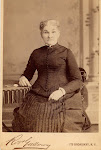
Isaac Peter Walch was the seventh and last child of Stephen Walch and Elizabeth Charnock. He was born in 1863 most likely in Hastings-on-Hudson, New York. His older sister Maggie, who was 13 years old at the time, would have helped in the care of her infant brother; and it was possibly that early bonding which cemented a lifelong relationship between the two.
At about the age of 16 Isaac, known as Ike, immigrated with his sister and brothers to Kansas. During the 1880 US Census of Caldwell, Kansas, Ike was living with his sister Maggie’s family and was working as a stonemason, most likely for his brother-in-law Tom Drew.
In about 1883 at the age of 20, Ike married a farmer’s daughter, Julia A. Booth, from nearby Bluff Township. In March 1885, Ike, Julia, and their six-month-old daughter Lillian were living next door to the Thomas and Maggie Drew family. He was still working as a stonemason at that time. Ike and Julia eventually had two more children: Viola, around 1885 and Isaac, Jr., in February 1887. Viola died in infancy and was buried in the Caldwell Cemetery.
If there were slow periods in the stone masonry business, Ike may have worked on the railroads as well. Caldwell in the late 1880s had become a major railway shipping point for cattle and was now home for many railroad workers. In any case, his work career was brief, for he died in 1889 at 26 years of age. He was the youngest and first of the Kansas Walch brothers to die. His wife Julia was 25 at the time and their two children Lillian and Ike, Jr. were 5 and 2 years old.
Two years after Ike’s death, Julia married Frank Robieson and had two more children: Frank, Jr., born in 1894 and Agnes, born in 1895. By 1900, the family was living at 710 E. 19th St. in Winfield. Frank was working as a mechanic and Julia as a bookkeeper at the time.
Julia died on September 3, 1947 in Winfield, 11 days before her 83rd birthday. She was buried in Graham Cemetery in Winfield near the grave of her father Wiley Booth.
Ike Walch, Sr., was buried in the Caldwell Cemetery next to the graves of his infant daughter Viola and his sister Margaret.
At about the age of 16 Isaac, known as Ike, immigrated with his sister and brothers to Kansas. During the 1880 US Census of Caldwell, Kansas, Ike was living with his sister Maggie’s family and was working as a stonemason, most likely for his brother-in-law Tom Drew.
In about 1883 at the age of 20, Ike married a farmer’s daughter, Julia A. Booth, from nearby Bluff Township. In March 1885, Ike, Julia, and their six-month-old daughter Lillian were living next door to the Thomas and Maggie Drew family. He was still working as a stonemason at that time. Ike and Julia eventually had two more children: Viola, around 1885 and Isaac, Jr., in February 1887. Viola died in infancy and was buried in the Caldwell Cemetery.
If there were slow periods in the stone masonry business, Ike may have worked on the railroads as well. Caldwell in the late 1880s had become a major railway shipping point for cattle and was now home for many railroad workers. In any case, his work career was brief, for he died in 1889 at 26 years of age. He was the youngest and first of the Kansas Walch brothers to die. His wife Julia was 25 at the time and their two children Lillian and Ike, Jr. were 5 and 2 years old.
Two years after Ike’s death, Julia married Frank Robieson and had two more children: Frank, Jr., born in 1894 and Agnes, born in 1895. By 1900, the family was living at 710 E. 19th St. in Winfield. Frank was working as a mechanic and Julia as a bookkeeper at the time.
Julia died on September 3, 1947 in Winfield, 11 days before her 83rd birthday. She was buried in Graham Cemetery in Winfield near the grave of her father Wiley Booth.
Ike Walch, Sr., was buried in the Caldwell Cemetery next to the graves of his infant daughter Viola and his sister Margaret.
. . .
Two family branches carry a story of a Walch family member being hung for horse thievery. If there is any truth to those rumors, then Ike would be the likely candidate, given the brevity of his life and the common practice of such hangings around Caldwell during his time. If ranch hands caught an individual with either a stolen horse or cattle, they were often hung on the spot without trial. However, there is no proof whatsoever that this was Ike’s fate. It simply may have been a good yarn.





No comments:
Post a Comment